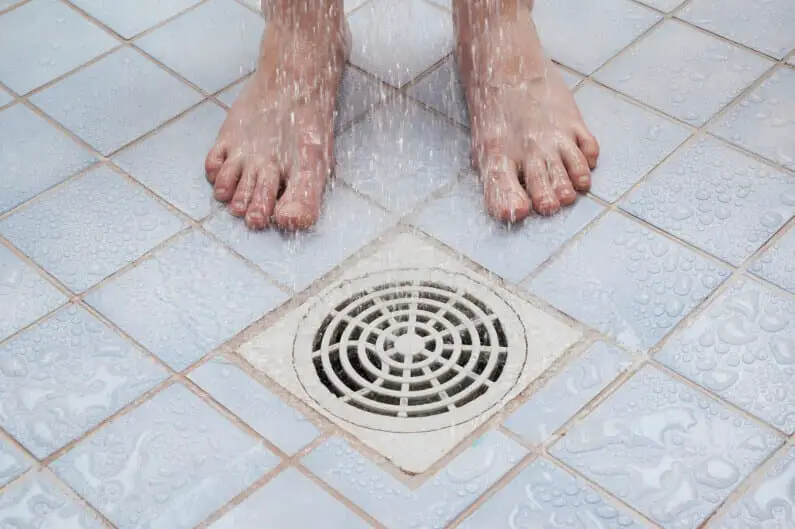The shower drain is slow but not clogged, which may be due to a partial blockage or accumulation of debris in the pipes. When water doesn’t flow freely down the drain, it can be frustrating and result in standing water in the shower.
However, there are several reasons why this may occur, including a buildup of soap scum, hair, or minerals from hard water. It’s important to identify the cause of the slow draining and address it promptly to prevent further issues. This article will explore possible causes and provide tips on how to resolve the slow shower drain problem.
By following these steps, you can restore proper drainage and enjoy a fully functional shower once again.
Common Causes Of A Slow Shower Drain
In a shower drain, a slow drain could be caused by multiple factors. One common culprit is hair buildup. As we shower, loose strands of hair can easily find their way down the drain, accumulating over time. This can lead to a buildup that restricts water flow. Another factor to consider is soap scum accumulation. Soap residues can accumulate in the drain pipe, forming a sticky film that can trap other debris and slow down the draining process. Finally, mineral deposits can also contribute to a slow shower drain. Over time, minerals like calcium and magnesium can build up in the pipes, narrowing the passage for water to flow through. Regular cleaning and maintenance can help prevent these common causes of a slow shower drain.
Signs Of A Slow Shower Drain
Water pooling in the shower: A clear sign of a slow shower drain is if you notice water pooling in the shower while you’re using it. This can happen due to hair, soap residue, or other debris that has started to build up in the drain.
Slow drainage: Another indication of a slow shower drain is if the water takes longer than usual to drain. You might find yourself standing in ankle-deep water while you shower, which can be frustrating and time-consuming.
Unpleasant odor: A slow shower drain can also lead to a foul smell in your bathroom. The buildup of hair, soap scum, and other organic matter can create a breeding ground for bacteria, resulting in an unpleasant odor that permeates the air.
Diy Methods How To Fix A Slow Shower Drain
A slow shower drain can be a frustrating issue to deal with, but it doesn’t always mean that it’s clogged. There are several DIY methods you can try to fix a slow shower drain without calling a plumber.
Removing hair manually: One common cause of a slow shower drain is a buildup of hair. You can try using a pair of tweezers or a drain snake to manually remove any hair that is blocking the drain.
Using a plunger: Another simple solution is to use a plunger to create a vacuum and dislodge any debris that might be causing the drain to be slow.
Flushing with hot water and vinegar: Pouring a mixture of hot water and vinegar down the drain can help dissolve any soap scum or mineral deposits that might be causing the slow drain.
Using Baking Soda and Vinegar for homemade cleaning: Mixing baking soda and vinegar to create a foaming solution can also be effective in clearing a slow shower drain. Simply pour the mixture down the drain and let it sit for at least 30 minutes before flushing with hot water.
Prevention Tips To Avoid A Slow Shower Drain
One effective way to prevent a slow shower drain is to install a drain trap. This simple device catches hair, soap residue, and other debris before they can enter the drain and cause clogs. By regularly cleaning the drain trap, you can ensure that it remains clear and allows water to flow freely.
Additionally, it is important to use drain covers in your shower. These covers act as a barrier, preventing small items such as jewelry or hair ties from falling into the drain and causing blockages. Regularly cleaning the drain cover will also help maintain optimal drainage.
In summary, taking these simple prevention measures can help you avoid a slow shower drain. By installing a drain trap and using drain covers, you can minimize the risk of clogs and ensure that water flows smoothly down your shower drain.
Maintenance Tips For Optimal Drainage
Regularly cleaning your shower drain is essential to ensure optimal drainage. Over time, hair and soap scum can accumulate and gradually slow down the flow of water. To prevent this, make it a habit to remove any debris from the drain after each shower. You can use a drain strainer to collect hair and other particles before they go down the drain, helping to prevent clogs. Avoid pouring grease or oil down the drain as it can solidify and create blockages. Instead, dispose of cooking greases in a separate container. If you’re wondering how to speed up a slow shower drain, you can consider using natural or commercial drain cleaners to remove any buildup that may be causing the water not to drain fast enough in the shower. By following these maintenance tips, you can keep your shower drain clear and ensure efficient drainage.
Frequently Asked Questions On Shower Drain Slow But Not Clogged
How Do You Fix A Slow Draining Shower?
To fix a slow-draining shower, you can try these steps: 1. Use a plunger to create suction and dislodge any clogs. 2. Remove the drain cover and clean out any hair or debris that may be blocking the drain.
3. Mix equal parts baking soda and vinegar, pour it down the drain, and let it sit for a while before flushing with hot water. 4. If the problem persists, you may need to use a drain snake or call a professional plumber.
Why Is Water Sitting In My Shower Drain But Not Clogged?
Water may sit in your shower drain without being clogged due to a slow drainage issue. It could be due to a partial blockage or a sluggish flow. Regular cleaning and maintenance can help prevent further problems.
Why Is My Shower Draining So Slowly?
Your shower may be draining slowly due to clogs in the pipes caused by hair, soap scum, or other debris. Cleaning or snaking the drain, using a plunger, or using a mixture of hot water and vinegar can help to unclog the drain and improve its drainage.
Why Is My Bathtub Not Draining No Blockage?
Possible answer: If your bathtub is not draining and there is no blockage, it could be due to a clogged vent pipe or a faulty drain stopper. Check if the vent pipe is clear of debris and make sure the drain stopper is properly functioning.
If the issue persists, you may need to seek professional assistance.
Why Is My Shower Drain Slow But Not Clogged?
There may be a build-up of hair, soap scum, or debris that is partially blocking the drain.
Conclusion
To sum up, if you find that your shower drain is slow but not clogged, there are several potential causes to consider. From mineral buildup to pipe issues, it’s important to investigate and address the issue promptly. Regular maintenance and cleaning can help prevent future drain problems.
Remember, a well-functioning shower drain ensures a hassle-free bathing experience. Stay proactive and keep your drain flowing smoothly.

